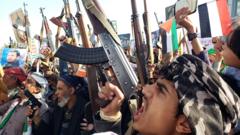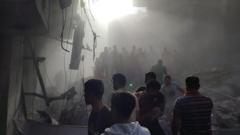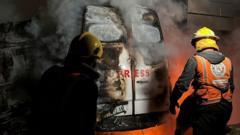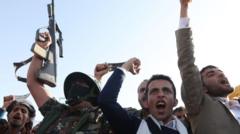The Houthis, led by Mohammed al-Bukhaiti, emphasize their commitment to retaliate against Israeli military actions, citing the ongoing conflict in Gaza and recent Israeli strikes on Yemeni infrastructure.
Houthis Commit to Ongoing Attacks Against Israel Amid Escalating Violence in Yemen

Houthis Commit to Ongoing Attacks Against Israel Amid Escalating Violence in Yemen
The Houthi political faction has vowed to intensify military operations against Israel despite the recent Israeli airstrikes on Yemen, framing their actions as support for the Palestinian cause.
In a significant escalation of regional tensions, Houthi officials have promised to increase their military actions against Israel, countering recent airstrikes that have targeted strategic locations within Yemen. Al-Bukhaiti, a political figure in the Houthi movement, asserted that the group will persist in its operations until Israel halts what they term "genocide in Gaza." The conflict erupted further after Israel conducted airstrikes on Yemen's Sanaa International Airport and coastal infrastructure, claiming such actions were necessary against the growing threat posed by Houthi missile and drone attacks.
In response to over a year of frequent assaults originating from Yemen, Israeli forces have engaged in multiple rounds of retaliatory airstrikes. Prime Minister Benjamin Netanyahu has asserted that Israel’s military response is on a trajectory to escalate. He framed the conflict as a "war of redemption," emphasizing a resolve to dismantle what he describes as a "terrorist arm" aligned with Iran.
The international community has expressed alarm, particularly with United Nations Secretary-General António Guterres calling for conflict de-escalation and restraint from all parties. There is growing concern over how these events have impacted humanitarian operations in Yemen, which already suffers from profound crises. The airstrikes, particularly those hitting civilian infrastructure, have raised critical questions regarding adherence to international laws and the potential for humanitarian crises to worsen in the region.
As tensions mount, the Houthis have made it clear they view their military actions as both a retaliation for the suffering in Gaza and an opportunity to directly confront the perceived collective threats posed by the U.S., U.K., and Israel. The situation reflects the complexities and interlinked nature of regional conflicts, where local struggles are often framed within the larger geopolitical narrative of the Israeli-Palestinian conflict and the broader Middle Eastern power dynamics.
This heightened military engagement comes as both sides brace for further retaliatory measures, with the potential for development into wider regional confrontations looming as the Houthis claim new military initiatives. As the conflict unfolds, the dire humanitarian situation in Yemen remains a critical concern.
In response to over a year of frequent assaults originating from Yemen, Israeli forces have engaged in multiple rounds of retaliatory airstrikes. Prime Minister Benjamin Netanyahu has asserted that Israel’s military response is on a trajectory to escalate. He framed the conflict as a "war of redemption," emphasizing a resolve to dismantle what he describes as a "terrorist arm" aligned with Iran.
The international community has expressed alarm, particularly with United Nations Secretary-General António Guterres calling for conflict de-escalation and restraint from all parties. There is growing concern over how these events have impacted humanitarian operations in Yemen, which already suffers from profound crises. The airstrikes, particularly those hitting civilian infrastructure, have raised critical questions regarding adherence to international laws and the potential for humanitarian crises to worsen in the region.
As tensions mount, the Houthis have made it clear they view their military actions as both a retaliation for the suffering in Gaza and an opportunity to directly confront the perceived collective threats posed by the U.S., U.K., and Israel. The situation reflects the complexities and interlinked nature of regional conflicts, where local struggles are often framed within the larger geopolitical narrative of the Israeli-Palestinian conflict and the broader Middle Eastern power dynamics.
This heightened military engagement comes as both sides brace for further retaliatory measures, with the potential for development into wider regional confrontations looming as the Houthis claim new military initiatives. As the conflict unfolds, the dire humanitarian situation in Yemen remains a critical concern.





















